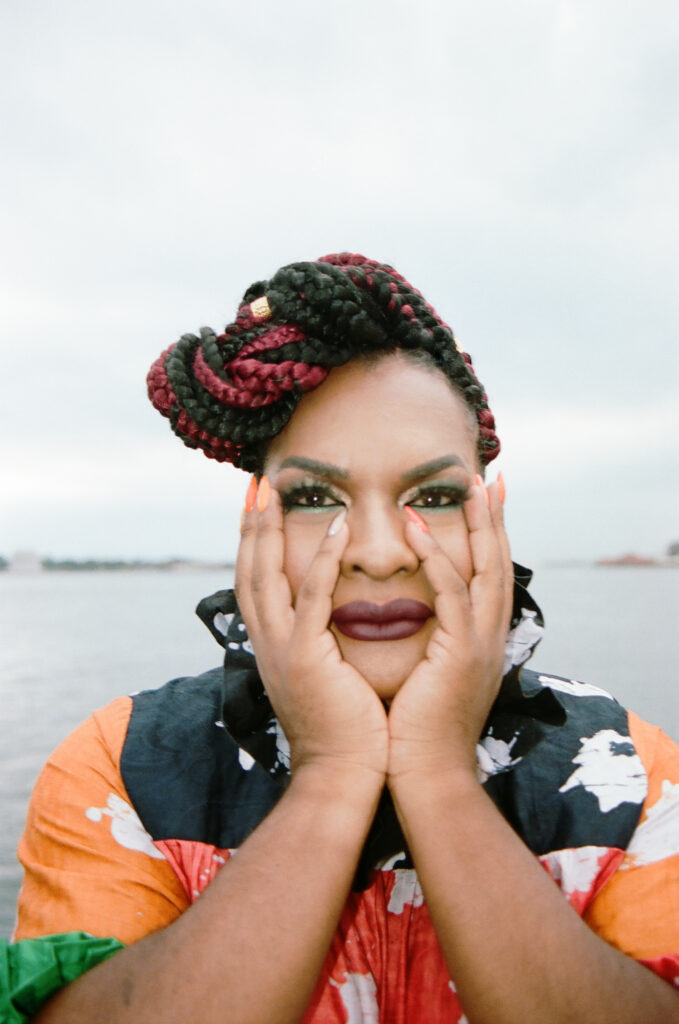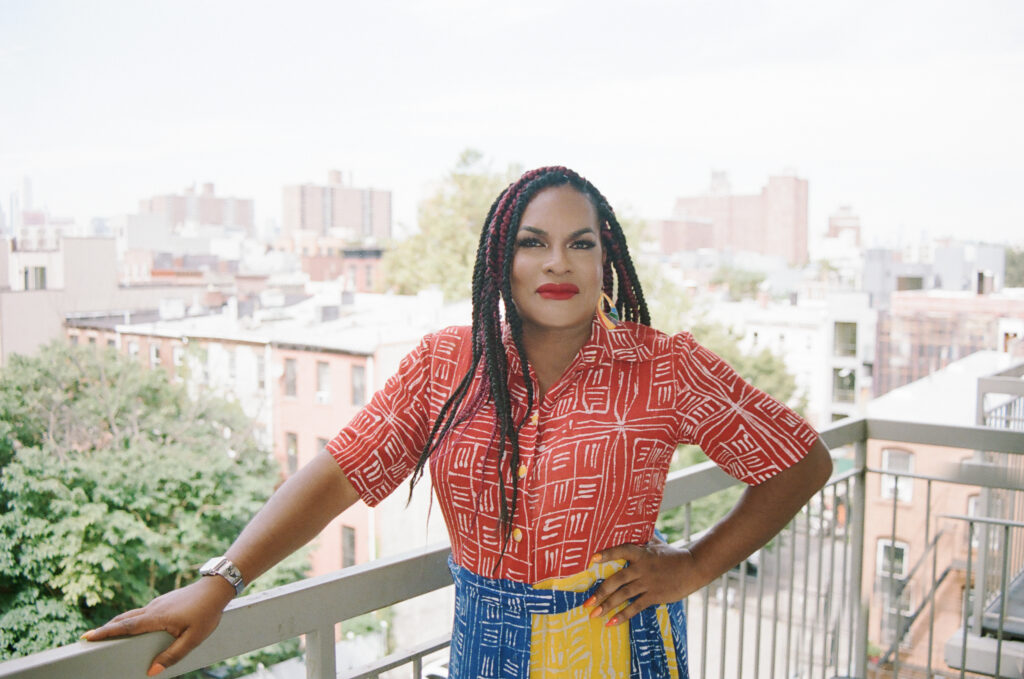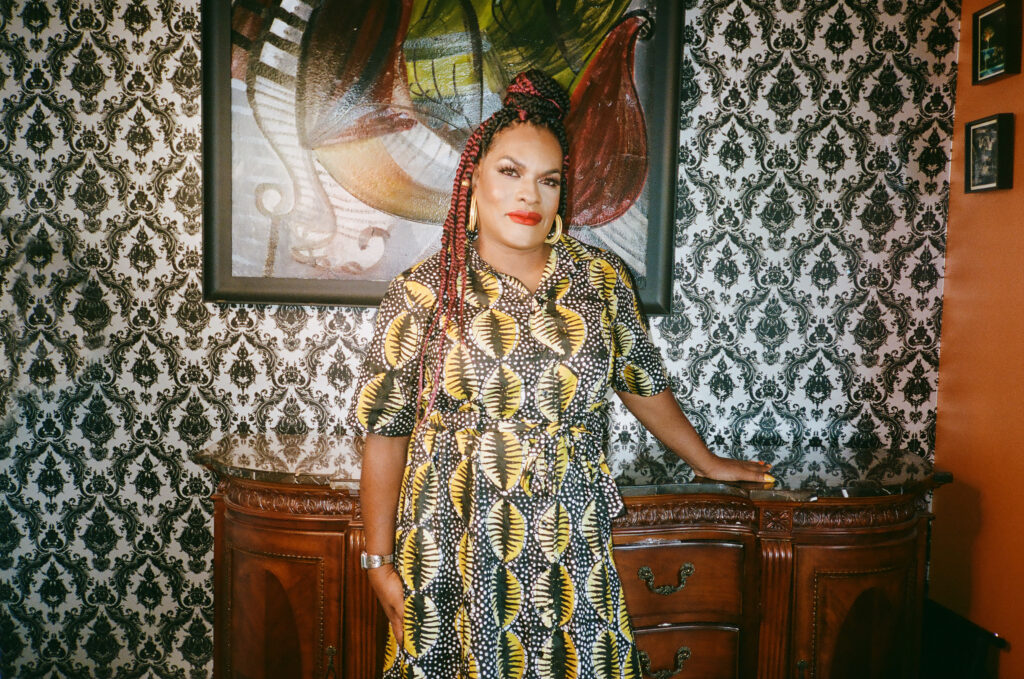Imara Jones and the new (trans) American revolution
For Women’s History Month, Queer Forty highlights the writing, activism and voice of Imara Jones, who is clear that Black trans women have an integral role in LGBTQ activism and intersectional feminism.
Photographer: Richie Shazam
Wardrobe: Busyao
Styling: Imara Jones
Hair: Sammy Lacombe
Makeup: Starr Simpson
Imara Jones—investigative journalist, intersectional feminist and number 17 across in The Crossword in the March 7 issue of the New Yorker—is the face of a generation of trans activists whose transgressive work challenges and infiltrates mainstream media and politics to advance social justice and civil rights for trans and non-binary people. She’s elegant and charismatic, an intellectual, a writer and an economist. She wears many hats and she wears them with elan and authority.
“When not everyone has the same rights, the rights of everyone are actually quite fragile.” — Imara Jones
In 2019 Jones chaired the first-ever “UN Women High-Level Meeting on Gender Diversity and Non-Binary Identities” at UN headquarters. At the UN meeting, which was attended by over 600 participants, Jones said, “We are at a stage where there is tremendous—one might say unprecedented—progress. There are trans people and gender nonconforming people and gay people and lesbian people and bisexual people who have been elected to offices around the world.”
She asserted, “There’s a tremendous amount of advance of rights, both in the global north and the global south, and of course tremendous representation in the media… But the violence and the backlash is also unprecedented and in some places in the world, historic.”
In 2020 Jones was featured on the cover of Time Magazine as part of its New American Revolution special edition, where she wrote an essay on “Why Black Trans Women Are Essential to Our Future.” As the creator of TransLash Media which she describes as a “cross-platform journalism, personal storytelling and narrative project, which produces content to shift the current culture of hostility towards transgender people in the U.S.,” Jones has won the coveted and prestigious Emmy and Peabody Awards.

In all her work, as with her WEBBY-nominated, “TransLash Podcast with Imara Jones,” as well as the investigative, limited series, “The Anti-Trans Hate Machine: A Plot Against Equality,” Imara Jones is focused on changing narratives—exploring and illuminating the lives of trans people, addressing issues of discrimination, harassment and violence faced by trans people and highlighting the achievements (against manifold odds) of trans people—especially trans women of color who have been most at risk and under threat.
Jones’s achievements are broad and diverse. The first Journalist-in-Residence at WNYC’s The Greene Space, she hosted the monthly program “Lives At Stake.” Her journalism has been featured regularly in The Guardian, The Nation, MSNBC, CNBC, NPR, Mic and Colorlines—publications for which she’s written about everything from the economics of immigration to how “Trans Women of Color Are the Past and Future of LGBTQ Liberation” to how “Repealing Obamacare would be devastating for transgender Americans”, to a plethora of articles on racism in America.
Jones is unafraid to call out issues within the trans and Black communities, as in her provocative essays “Confronting Black men’s roles in the murders of Black transgender women may be the only way to save our lives” in which Jones asks “where are our pro-Black institutions in the growing crisis against Black transgender women?”; and in “While Morehouse College’s decision to admit trans men is significant, it’s completely at the expense of trans women.”

Jones has also done critical work in mainstream politics and communications, as an economic policy advisor in the Clinton White House and holding communications positions at Viacom, the multinational mass media conglomerate. With an undergraduate degree in political science from Columbia University, and a master’s degree in economics from the London School of Economics, Jones is also a 2021 Nathan Cummings Foundation Fellow and a 2019 Soros Equality Fellow. The Soros Equality Fellowship program supports innovators and risk-takers striving to create and develop new ways of tackling the systemic causes and symptoms of racial disparity and discrimination.
Jones was appointed by former New York City mayor Bill de Blasio to serve on the New York City Commission on Gender Equity. She also serves on the boards of the Transgender Law Center, Anti-violence Project, GLSEN, The LGBTQ+ Museum and the New Pride Agenda.
It is, as they say, a lot—so much illumining of trans lives and so much critical writing detailing the critical role Black trans women play in past and present political action. Jones is focused and driven and she never seems to stop working, approaching her work as the state of emergency we are currently enmeshed in with far-right extremists like GOP governors Ron DeSantis and Greg Abbott and House rep Marjorie Taylor Greene laser-focused on anti-LGBTQ legislation.
Queer Forty caught up with her at the end of Black History Month where she talked to us about some of the most pivotal issues for trans Americans at a time when the GOP is in an all-out “culture war” against trans youth and trans women in particular.
We asked Jones to detail what TransLash Media does and what its role is. She said, “TransLash tells trans stories to save trans lives. We began in 2018 as a three-part, award-nominated docuseries that focused on what it’s like to be trans and gender non-conforming (TGNC) during the Trump-era and during an anti-transgender backlash in the United States.”
Since then, she said, “we have evolved into TransLash Media: a cross-platform media nonprofit & digital community, which uses the power of journalism and non-fiction storytelling to reinforce a sense of community and to tell the rest of the world about what’s happening to us.”
Jones says Trans Lash Media’s is “using these tools to create podcasts, documentaries, short films, animation, zines, written essays and digital content to get these messages out to as many people as possible.”
She adds, “That’s why I am incredibly proud of everything that we’re doing including our GLAAD nominated ‘TransLash Podcast with Imara Jones,’ the award-winning ‘Anti-TransHate Machine: A Plot Against Equality’ investigative series, as well as our award-winning short films such as those in our ‘Trans Bodies, Trans Choices’ series.”
Queer Forty wanted Jones to speak to the continuing issue of the killings of trans women, which we have referred to it as an epidemic of violence that is both a collective tragedy and an outrage for our community.
Jones deconstructed the layers of harassment, discrimination and violence and their nexus. She said, “Black trans people are the most marginalized of the marginalized in every single way imaginable. This extreme marginalization puts us at risk for multiple forms of violence—economic, cultural, policy and political—which ultimately culminate in extreme physical violence.”

As she explained, these killings are directly linked to the discriminatory and oppressed position Black trans women hold. “In fact the murders of Black trans women are a natural consequence of this array of attacks on our community,” Jones says. “Studies by the FBI, for example, show that the more economically marginalized you are the more likely violence will be a reality in your everyday life. Therefore a key way to end the epidemic of violence against Black trans women, which is among the worst of any countries on the planet, is to end the exclusion of Black trans women from equitable opportunities.”
Having reported on the breadth of GOP-sponsored anti-LGBTQ bills in state legislatures, we asked Jones what her take was on the GOP’s war on trans youth in particular and trans people in general?
Jones explained, “The first thing that we have to understand is that what the GOP is doing is part of a larger strategy that is both ideological and cynical in its nature. They believe that trans people shouldn’t exist, and the years of focus groups—which they conducted on trans issues—have led them to understand that the best way to attack trans people is to attack the idea of trans youth.”
She said that Republicans “believe that these attacks will help them win office by exciting their core voters and peeling off independent voters who are uncomfortable with trans people. That’s why it is both ideological and cynical. It’s also why we see the widespread introduction of these bills across the country in the form of state-by-state copycat bills and see which one passes first for other states to copy. What’s happening in Oklahoma, Kansas, Mississippi, and South Carolina are good examples.”
Jones sums it up for us: “So this is all a bid to win power. And the attack on trans people is one of the only things conservatives and white Christian nationalists have in common right now.”
Speaking with Jones at the intersection of Black History Month and Women’s History Month we wanted to know what she had to say about the importance of recognizing Black trans women during these celebrations. Black lesbian theorist and poet Audre Lorde said, “I am not free while any woman is unfree, even when her shackles are very different from my own.”
Jones said, “We know that there can’t be full freedom in our society without Black trans liberation. In fact, the vision of Black trans women is essential to bringing about a free society.”
She reminds cis people: “Trans people are not new. We have always been here, but actively cast out of history. When you live in a society that stifles fluidity and possibility, it raises a question of whether or not you deserve rights or a place in that society. Generally speaking, society fails Black trans women. That’s how we get to epidemic levels of violence, mass levels of unemployment and a lack of education for us and about our existence.”
For years, Jones said, “Trans people have been marginalized within movements because of the idea that anything not accessible to mainstream society is damaging to the prospect of Black liberation. But we’ve learned from history that this incremental approach has been a failure—because when not everyone has the same rights, the rights of everyone are actually quite fragile.”
Much of what Jones says is as poignant as it is powerful, illuminating how painful life on the dangerous margins of society is and continues to be, and how critical real allies are. Trans people, Black trans people especially, Jones said, “show the power and the resilience of change, and possibility of how we can do things differently by simply existing in our society.”
She explicates how this is not about breaking things but building things new and inclusive. Jones said, “We are seeking to create a future less defined by gender roles, and more by what we can create together, rather than what we can destroy. Because we’ve already had to do this work, we are essential to building a future in which these intersectional identities coexist.”

Much of the media emphasis has been on issues facing trans youth, but there is little discussion about aging for trans people. Last month Queer Forty reported with SAGE about how LGBTQ people face different issues and perils as they age, in health, economics and discrimination. We wanted to know what, if any, are the key issues facing trans women 40+?
Jones said, “Trans people over 40 face the full array of challenges which all trans women face. However these can be compounded by the lack of economic earning power over the decades, ageism, and health challenges. Therefore we need a comprehensive approach to address these additional issues for trans people over the age of 40.”
With all of these issues facing trans people and trans women of color in particular, what do cis-het (and the LGBTQ community) need to do to address the income and health disparities for trans people that Queer Forty has been reporting on since the pandemic, and which have been exacerbated by the pandemic?
Jones is succinct: “They need to care by making their voices heard to their local political leadership and by supporting their local trans communities.”
For Jones, the focus remains her community and trans lives. As she told Politico a year ago about her direction, “I lead with the ability to follow my instinct for what I think is not being spoken about, revealed, heard, hidden.”
A truly intersectional figure, she speaks to both the trans community and cis society at this critical political juncture. Jones says, “When trans people have the ability to tell our stories, we can save our own lives and encourage those who care about us to take action.”






